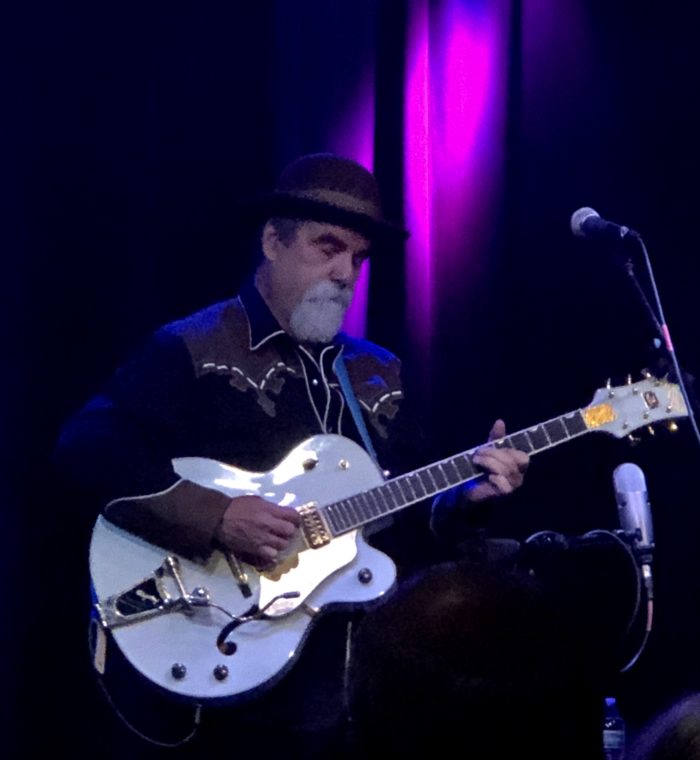The last time Darrell Scott visited central Ohio, he was on the road with the Zac Brown Band and found himself playing to 80,000 people inside Ohio Stadium.
“That was wild,” he said. “I’m glad to have found another place to play in Columbus.”
Scott was speaking Sept. 29 from the stage of Natalie’s Coal Fired Pizza and Live Music where perhaps 80 people watched and listened to him put on spellbinding solo concert that touched on country, blues, jazz, folk, rock, gospel and more over the course of an hour and 45 minutes.
Scott – who’s toured and recorded in Guy Clark and Robert Plant’s bands, written songs for the Dixie Chicks (“Long Time Gone”), released a slew of acclaimed solo albums and whose “You’ll Never Leave Harlan Alive” is a modern classic – is a musician’s musician, a fancy term for a criminally underappreciated talent. But he seemed happy in the cozy confines of the pizza joint. And he delivered the goods.
Accompanying himself on hollow-bodied electric guitar, six-string acoustic guitar and piano, Scott previewed tracks from the four albums, including a Hank Williams tribute, he’s working on – “It sounds crazy, but it’s just music,” he said – sung Joe South’s “Games People Play,” briefly turning the restaurant into a church with his soulful electric piano; played the Carter Family’s “Keep on the Sunny Side,” which he put in his sets after watching “Country Music: A Film by Ken Burns;” and honored a request for “River Take Me” after telling the fan, “It’s been switched to ‘Reefer Take Me,’” which it had not.
With a bushy, white goatee and dressed in a brown, Western-style shirt and bowler hat, Scott was a fountain of music that poured forth seemingly without effort. He often backed away from the mic between verses to play jazzy or blues-tinged solos on his electric guitar and did such with such a precise touch, so much texture, they never sounded empty in the absence of backing musicians. On acoustic guitar, Scott plays with subtle power, coaxing big sounds from the instrument that looks so small against his large frame.
In Scott’s hands and voice, Clark’s “Desperados Waiting for a Train” became a joyful singalong. Townes Van Zandt’s “White Freightliner Blues,” meanwhile, was played to pin-drop silence and Scott’s resounding voice and forceful, blues riffs filled the restaurant with the aura of sweet trouble in mind.
Playing without a setlist as per typical, he took his guitar with him when he sat down at the piano for “Harlan.” Switching instruments seamlessly as he sung about the hardscrabble Kentucky town where the sun comes up about 10 in the morning … and goes down about 3 in the day, Scott was in that moment a profoundly talented multi-instrumentalist, a sharp observer of cultural and economic injustices, a resounding vocalist capable of rising and falling as his words demand and a man who should be playing bigger venues.
He was – and is – a criminally underappreciated musician’s musician and songwriter’s songwriter.



1 Comment comments associated with this post
Chad Brace
October 25, 2019 at 2:18 pmWell written, Kristopher.
I’m a Columbus, OH German Village resident & OSU English major graduate who knows quality writing when I see it. I’ve been reading your OH performances & artists releases reviews starting with what I believe to be your 1st, Leo Kottke’s Newark, OH Thirty One West 2016 performance.
As someone who’s been on the OH scene since Ekoostik Hookah became a band playing South Heidelberg every Wed. night in 1992, it’s cool to have someone like you giving the great music state of OH some love. I’ve been to nearly all the venues & seen most of the artists you review. As a result, I can visualize the performance when reading your reviews.
Keep ’em comin’, and I hope to meet you during a future Old Towne East Natalie’s, Grandview Woodland’s Tavern, and/or Nelsonville’s Stuart Opera House show in the future.